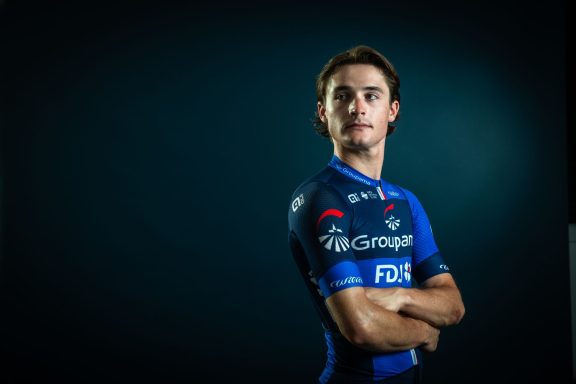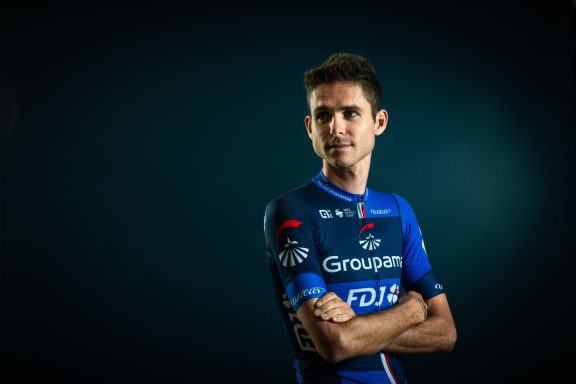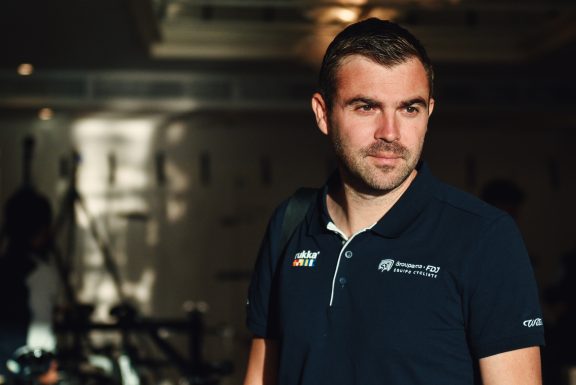As the 2021 cycling season is about to start for good, some race organizers have already been forced to cancel their event due to the health crisis that is still very much on-going. Although the calendar is experiencing some primary changes, Yvon Madiot, head of the Groupama-FDJ’s sports department, still wants to be optimistic as he takes stock of the situation a few days before the first pro race on French territory.
Yvon, to this day, which cancellations are you aware of for the start of the season? And what are the consequences?
For now, as far as we are concerned, we have to deal with the cancellation of the Tour of Algarve, which is normally postponed in May. We also learned of the outright cancellation of the Circuit de la Sarthe, in April. The latter has especially a consequence on Arnaud Démare’s program. Generally speaking, there is obviously a risk for all the races that lie ahead, and all will depend on the restrictions that will be announced this week. We might have no races at all, or we could be prevented from getting to the races. That being said, we remain confident. Our first races, which are the Grand Prix La Marseillaise and the Etoile de Bessèges, appear to be on track. On another hand, we have the Tour of the Community of Valencia. A race took place in that area last weekend and they just had to relocate the finish outside of the city. It is actually likely that we will witness more of these adjustments regarding finishes, so they would not be located inside the cities. As for the Tour of Algarve, it was supposed to be the return to racing of the Classics riders. This is the only real issue at the moment for us. It’s a shame, for sure, but we can deal with it. It will just change the program of a few riders. Some will not be able to return to racing on the scheduled dates and others will have to change races.
“The house of cards must not fall apart”
Did you prepare for these potential cancellations?
Yes and no. We still wanted to have last year’s basis in mind, when the program went as planned and the competitions took place almost normally in the second part of the season. We thought that it would be the same for the season restart and that we would get going again with the bubbles, tests, and protocols that proved efficient last year. Of course, we are aware that everything can stop, but we wanted, and still want, to be optimistic. Either way, it would have been impossible to conceive a plan B or a plan C. There aren’t that many races at the start of the season, so we actually don’t even have the chance to do it. However, it is right now that we need to show our adaptability and be ready to respond to the various announcements. We imagined a few scenarios in the case that the competitions will go ahead. We did not, however, in the case of the overall and strict lockdown. It would be very difficult to stop the riders in February. They didn’t race at all, they went in training camps and have committed all winter. It would be the worst thing. We’d rather not consider it, but it’s necessarily in the back of our minds. We don’t have control over those decisions anyway, so we should and need to act as if most of the competition will indeed take place. It would be too dangerous to do the opposite, meaning to think: “Anyway, we’re going to be confined, so what’s the point?”
The desire to compete is stronger than everything else…
We are all driven by competition, including us sports directors. We’re not going to say: “there is no problem”, because that is not true. But we are confident and we are ready to race. It’s pretty much the general watchword. It is always better to be in these conditions, even if you then have to endure a cancellation and get back from scratch. This is our speech to the riders. As we speak, everything is being done to ensure that we are ready for the competitions; physical preparation, logistics, everything is underway. We are confident and we are on the move, but we are also ready to take bad news. The house of cards we have built must not fall apart if a race is called off. We act to be in the best possible condition on D-Day, and we will react if necessary. For that reason, we try to be as close as possible to our riders and explain to them our plan if there should be some early difficulties. From this point of view, we are now less stressed. We also know that the riders can be in good shape for the return to racing even without competing beforehand. We are also able to change our teams quickly thanks to our logistics. We are less worried about the issues that may arise.
“We are under much less pressure”
Has 2020 helped you in handling such situations?
Certainly. There is less of a panic feeling. Last year, we kept redesigning races programs with the coaches and sports directors; only to learn two days later that another race was cancelled or postponed. Today, we have the outlines in mind, we believe the big races will go ahead, and we are under much less pressure. We also gained the certainty that even without taking part in a particular race, the riders could be competitive straight away thanks to the training methods we developed. That is also why we want to be in this positive approach: because we know that we will be able to manage any change of program, especially thanks to last year’s experience. We realized that we dealt pretty well with the first lockdown, so we are really confident from that point of view. We are pretty sure that if there is a cancellation, we will be able to respond the right way and keep our riders in shape. I’m not worried at all about the physical part of things. We have the hindsight of the past year and the skills to deal with it. The trickier issue to deal with, actually, could be the psychological part. It will be up to us to make sure the riders don’t crack. Perhaps some will endure two consecutive cancellations and have to continue training without racing. We will need to be there to discuss it with them so that the house of cards does not fall apart.
That being said, preparation seems to be in full swing right now.
The preparation never was determined by the fear of such or such cancellation. We have to be prepared, no matter the size, location or level of the race we get ready for. We have set up tailor-made training camps. This year even more than usual. We adjust our camps according to the qualities of our riders. We have also adjusted in terms of numbers this time. We didn’t want to end up with a hundred persons in a camp, despite the convenience and the benefits it brings. Not only would it have been difficult to find hotels large enough, but first and foremost, it would have been tricky to manage. Although the risk would have been very slight, now is not the time to take it. That is why we suggested these customizable camps. For us, it was the safest thing to do from a health point of view, for our riders, for the staff and for all of our employees. Therefore, the groups are way smaller but we have still kept the same screening policy, the same protocol. We reproduce the “racing bubble” in our camps, and the smaller the bubble, the easier it is to handle. If one person were to get sick, we wouldn’t have to isolate another 80. We thus limit mixing too many people. Logistically, it was obviously a bit more difficult than usual to organize, in particular to provide vehicles everywhere on different dates, but that’s also the price to best ensure our riders safety.
Race cancellations obviously affect the teams, but they primarily affect the organizers themselves don’t they?
Of course, and we think of them a lot. It’s not easy to organize a cycling race in normal times, as a lot of things come into play. So if in addition to that come significant health restrictions, we can only imagine the difficulties they may face. I am thinking of those who have provided a huge amount of work but who are forced to give up three weeks before the event, like in Algarve. They committed a lot for it, the organizers surely had some restless nights, so it must be heartbreaking to see it all vanish. It should be remembered that very often, the organizers are volunteers, especially in the “small” races. They take responsibilities just for the fun and love of cycling. We need to keep in mind that these people work a lot for little return, or none in such times. We spare a big thought for them. One thing is for sure however. Given the situation today, an organizer who will manage to maintain his race will be pretty much guaranteed to have a very high level field at the start.



No comment